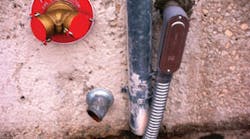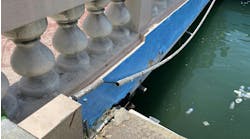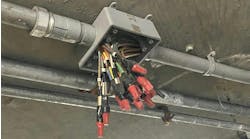How well do you know the Code? Think you can spot violations the original installer either ignored or couldn't identify? Here's your chance to moonlight as an electrical inspector and second-guess someone else's work from the safety of your living room or office. Joe Tedesco, who has a knack for finding shoddy electrical work, did the dirty work and found this mess. Now it's your turn to identify the violation.
Find the Answer
Answer:
Bart Gilbreath, an electrical design engineer with Garver Engineers, Fayetteville, Ark., submitted these comments. “The flexible metal conduit looks like it was installed underground, and into the concrete foundation. The [flexible metal conduit] FMC is also installed in a wet location (see fire sprinkler and mildew) and is located in an area subject to physical damage. These all are violations of 348.12.”
In addition to noting the same violations of 348.12, Bill Marino, a maintenance electrician with the U.S. Postal Service in Wallingford, Conn., noted that 300.5(D)(1) and (4) also deal with “protection from damage.” Rule (1) states that any direct buried circuits that emerge from grade must be protected a minimum of 2.5 meters (8 feet) above finished grade. Rule (4) states where the conductors are exposed to physical damage they shall be protected by RMC, IMC, or Schedule 80 RNMC (or equal).
Robert Henning, Jr., an electrical designer with Gatter & Diehl, Inc., Harrisburg, Pa., pointed out most of the same violations as noted above.
As per 348.12(1), FMC shall not be used in wet locations unless the conductors are approved for the specific conditions and the installation is such that liquid is not likely to enter raceways or enclosures to which the conduit is connected. Listed FMC is permitted for use in wet locations, provided the completed installation prevents water from entering enclosures or other raceways to which the conduit is connected.
For this application, the conductors must be suitable for wet locations. Listed FMC (½ inch and larger) may be installed in unlimited lengths, provided an equipment grounding conductor is installed with the circuit conductors. See 250.118(5) as well as 348.60 for specific requirements related to the use of FMC as an equipment grounding conductor. In addition, FMC shall not be used underground or embedded in poured concrete or aggregate [348.12(6)], nor where subject to physical damage [348.12(7)].



